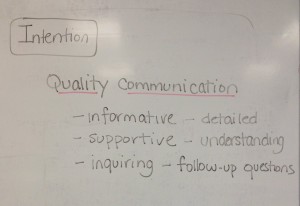 Do you ever sit through something and wonder “What’s the point of this?” I know that I often do. It pushed me to share with students why we are doing what we are doing. It will also assist me in my goal of implementing daily learning intentions for each class. So it a goal of mine to have students learn to/start to/be able to articulate what makes their interpersonal interactions rich & interesting. What makes it what I call ‘quality communication’? I ask my senior (3rd & 4th semester) students this often and finally I’ve found the acronym that I am looking for. So for me the purpose of their interactions can be summarized with the phrase “Quality Communication ISS….”
Do you ever sit through something and wonder “What’s the point of this?” I know that I often do. It pushed me to share with students why we are doing what we are doing. It will also assist me in my goal of implementing daily learning intentions for each class. So it a goal of mine to have students learn to/start to/be able to articulate what makes their interpersonal interactions rich & interesting. What makes it what I call ‘quality communication’? I ask my senior (3rd & 4th semester) students this often and finally I’ve found the acronym that I am looking for. So for me the purpose of their interactions can be summarized with the phrase “Quality Communication ISS….”
Informative – for us this means “Are you providing details & extended information?” Are you including descriptors, connecting ideas, giving reasons, describing ‘how’ you do something and more? This is always related to the level of proficiency of the students. But it is a push to have them try to maximize the amount of the information that they provide….and I find it spills out into their presentation speaking/writing as well (helped along by including it my rubrics). One exercise that we use to help build this in the earlier years is a brainstorming “Wheel of Detail“. I find then as we employ this strategy my Yr3&4 students add can start to do this ‘on the fly’ as well.
Inquiring – communication is not a one-way street. Are you asking the all important follow-up questions? Are you extending the conversation by asking questions related to what is being said? Are you digging for details that you are not hearing? We start purposefully with this in Yr1 in a ‘question game‘ because quite frankly I don’t believe many of us are ‘natural communicators’ and include it in all of my interpersonal rubrics because I consider it so key. If you are not asking questions…if you are not looking for details then you are letting your side of the communication down….
Supportive – this is a ‘dual purpose’ question for my classes. It speaks to the ability to help someone understand what you are saying. The idea that you can use any word/concept you want as long as you can get your meaning across. But it also requires students to have the confidence to say when they don’t understand. Again I start this in Yr1 and my students practice both sides of this supportive communication. I find that the ‘nerves’ around speaking are then lessened when “what if I don’t understand?” is not an issue. Students relax & know that it doesn’t matter who they are speaking with, no matter their level of proficiency, because their partner(s) will be supportive of them. In fact I often pair those of ‘varying’ levels to ensure that they develop, and practice, these supportive skills.
It’s taken time for me to articulate what I hope quality communication will be for my students….and support them in pursuing it both in and out of class…
Colleen



